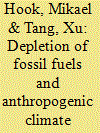|
|
|
Sort Order |
|
|
|
Items / Page
|
|
|
|
|
|
|
| Srl | Item |
| 1 |
ID:
121377


|
|
|
|
|
| Publication |
2013.
|
| Summary/Abstract |
Interest in the role embodied energy plays in international trade and its subsequent impact on energy security has grown. As a developed nation, the UK's economic structure has changed from that of a primary producer to that of a primary consumer. Although the UK's energy consumption appears to have peaked, it imports a lot of energy embodied in international trade alongside the more obvious direct energy imports. The UK has seen increasing dependency on imported fossil energy since the UK became a net energy importer in 2005. In this paper an energy input-output model is established to calculate not only the amount of fossil energy embodied in UK's imports and exports, but also the sector and country distributions of those embodied fossil energy. The research results suggest the following: UK's embodied fossil energy imports have exceeded embodied fossil energy exports every year since 1997, UK embodied energy imports through the so-called 'Made in China' phenomena are the largest accounting for 43% of total net fossil energy imports. If net embodied fossil energy imports are considered, the gap between energy consumption and production in UK is much larger than commonly perceived, with subsequent implications to the UK's energy security.
|
|
|
|
|
|
|
|
|
|
|
|
|
|
|
|
| 2 |
ID:
091571


|
|
|
|
|
| Publication |
2009.
|
| Summary/Abstract |
Crude oil is a limited natural resource subject to depletion and several reports indicate that the world's crude oil production is close to the maximum level and that it will start to decrease after reaching this maximum. A post-Kyoto political agenda to reduce oil consumption will have the same effect on aviation fuel production as a natural decline in the crude oil production. On the other hand, it is predicted by the aviation industry that aviation traffic will keep on increasing.
|
|
|
|
|
|
|
|
|
|
|
|
|
|
|
|
| 3 |
ID:
117293


|
|
|
|
|
| Publication |
2013.
|
| Summary/Abstract |
Future scenarios with significant anthropogenic climate change also display large increases in world production of fossil fuels, the principal CO2 emission source. Meanwhile, fossil fuel depletion has also been identified as a future challenge. This chapter reviews the connection between these two issues and concludes that limits to availability of fossil fuels will set a limit for mankind's ability to affect the climate. However, this limit is unclear as various studies have reached quite different conclusions regarding future atmospheric CO2 concentrations caused by fossil fuel limitations.
It is concluded that the current set of emission scenarios used by the IPCC and others is perforated by optimistic expectations on future fossil fuel production that are improbable or even unrealistic. The current situation, where climate models largely rely on emission scenarios detached from the reality of supply and its inherent problems are problematic. In fact, it may even mislead planners and politicians into making decisions that mitigate one problem but make the other one worse. It is important to understand that the fossil energy problem and the anthropogenic climate change problem are tightly connected and need to be treated as two interwoven challenges necessitating a holistic solution.
|
|
|
|
|
|
|
|
|
|
|
|
|
|
|
|
| 4 |
ID:
110726


|
|
|
|
|
| Publication |
2011.
|
| Summary/Abstract |
The Deepwater Horizon incident demonstrated that most of the oil left is deep offshore or in other difficult to reach locations. Moreover, obtaining the oil remaining in currently producing reservoirs requires additional equipment and technology that comes at a higher price in both capital and energy. In this regard, the physical limitations on producing the ever-increasing quantities of oil are highlighted as well as the possibility of the peak of production occurring this decade. The economics of oil supply and demand are also briefly discussed showing why the available supply is basically fixed in the short to medium term. Also, an alarm bell for economic recessions is shown to be when energy takes a disproportionate amount of total consumer expenditures. In this context, risk mitigation practices in government and business are called for. As for the former, early education of the citizenry of the risk of economic contraction is a prudent policy to minimize potential future social discord. As for the latter, all business operations should be examined with the aim of building in resilience and preparing for a scenario in which capital and energy are much more expensive than in the business-as-usual one.
|
|
|
|
|
|
|
|
|
|
|
|
|
|
|
|
| 5 |
ID:
092811


|
|
|
|
|
| Publication |
2009.
|
| Summary/Abstract |
According to the long-term scenarios of the International Energy Agency (IEA) and the US Energy Information Administration (EIA), conventional oil production is expected to grow until at least 2030. EIA has published results from a resource-constrained production model which ostensibly supports such a scenario. The model is here described and analyzed in detail. However, it is shown that the model, although sound in principle, has been misapplied due to a confusion of resource categories. A correction of this methodological error reveals that EIA's scenario requires rather extreme and implausible assumptions regarding future global decline rates. This result puts into question the basis for the conclusion that global "peak oil" would not occur before 2030.
|
|
|
|
|
|
|
|
|
|
|
|
|
|
|
|
| 6 |
ID:
094289


|
|
|
|
|
| Publication |
2010.
|
| Summary/Abstract |
The assessment of future global oil production presented in the IEA's World Energy Outlook 2008 (WEO 2008) is divided into 6 fractions; four relate to crude oil, one to non-conventional oil, and the final fraction is natural-gas-liquids (NGL). Using the production parameter, depletion-rate-of-recoverable-resources, we have analyzed the four crude oil fractions and found that the 75 Mb/d of crude oil production forecast for year 2030 appears significantly overstated, and is more likely to be in the region of 55 Mb/d. Moreover, analysis of the other fractions strongly suggests lower than expected production levels. In total, our analysis points to a world oil supply in 2030 of 75 Mb/d, some 26 Mb/d lower than the IEA predicts.
The connection between economic growth and energy use is fundamental in the IEA's present modelling approach. Since our forecast sees little chance of a significant increase in global oil production, our findings suggest that the "policy makers, investors and end users" to whom WEO 2008 is addressed should rethink their future plans for economic growth. The fact that global oil production has very probably passed its maximum implies that we have reached the Peak of the Oil Age.
|
|
|
|
|
|
|
|
|
|
|
|
|
|
|
|
|
|
|
|
|